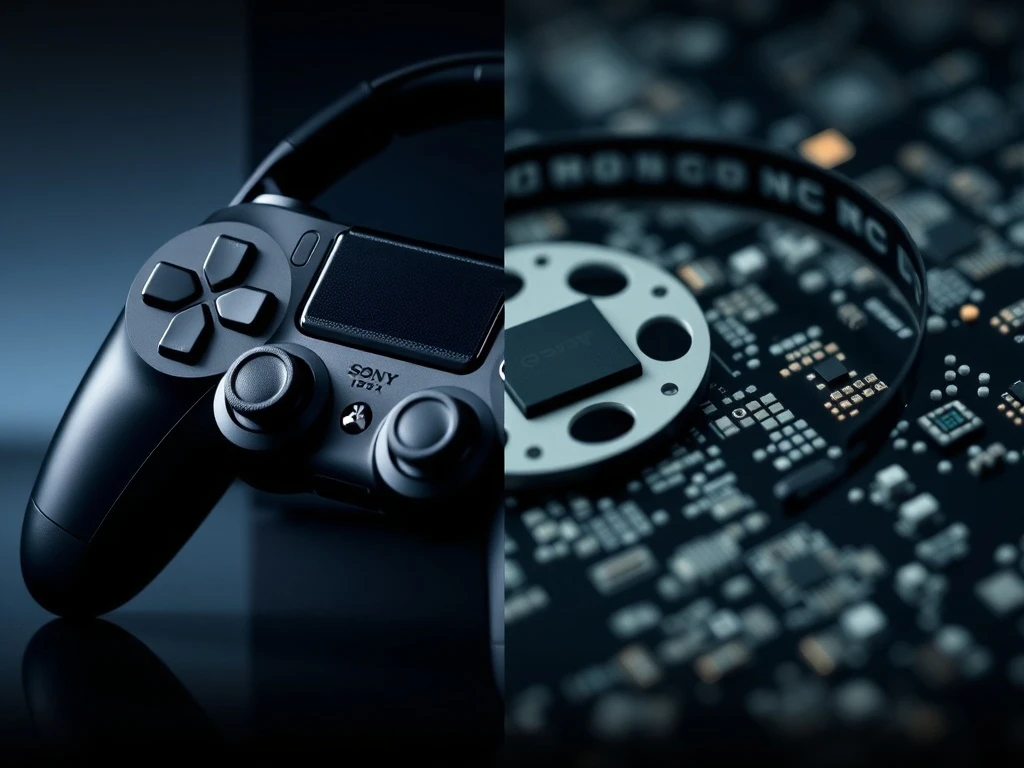Sony Strategic Shift: Unveiling a Pivotal $300M Semiconductor Sale for Gaming & Content Dominance

In the dynamic world of global corporations, adaptability is key. Just as the crypto market constantly redefines itself, major players like Sony are making bold moves to sharpen their focus and enhance shareholder value. Sony Group Corporation is reportedly exploring the sale of its Israeli-based semiconductor unit for an estimated $300 million. This significant move signals a profound Sony strategic shift, aiming to re-center its vast empire on high-margin entertainment sectors like gaming and content production. What does this mean for one of the world’s most recognized brands, and how does such a divestiture reflect broader industry trends?
Why is Sony Undergoing a Sony Strategic Shift?
For decades, Sony has been a household name, synonymous with innovation across electronics, entertainment, and even finance. However, the corporate landscape is unforgiving, demanding constant evaluation of core competencies and profitability. Sony’s reported decision to offload its semiconductor unit isn’t just a simple transaction; it’s a calculated maneuver to streamline operations and maximize returns. Here’s why:
- Focus on Profitability: Sony’s entertainment divisions, including PlayStation, Sony Pictures, and music, contributed a staggering 60% of the company’s total profit in the most recent fiscal year [2]. This clearly highlights where Sony’s strengths and future growth potential lie.
- Streamlining Operations: The Israeli semiconductor unit, originally acquired as Altair Semiconductor for $212 million in 2016, has an annual recurring revenue of approximately $80 million [5]. While valuable, its revenue contribution is relatively limited compared to Sony’s entertainment and electronics giants [4].
- Industry Trends: The broader tech industry is seeing a trend of companies divesting non-core assets to focus on their primary business lines, enhancing shareholder value and agility in competitive markets.
The Details of the Semiconductor Unit Sale
The unit in question, Sony Semiconductor Israel, specializes in cellular Internet of Things (IoT) chipsets and AI-driven image sensing technologies [1][2]. This niche market is certainly innovative, but perhaps not aligned with Sony’s long-term vision as an entertainment powerhouse. According to three sources with knowledge of the matter, Sony has engaged investment bankers to explore potential transactions [1][2].
Key Aspects of the Potential Sale:
| Aspect | Details |
|---|---|
| Unit Name | Sony Semiconductor Israel (formerly Altair Semiconductor) |
| Original Acquisition | $212 million in 2016 [5] |
| Specialization | Cellular IoT chipsets, AI-driven image sensing technologies [1][2] |
| Annual Revenue | Approximately $80 million [5] |
| Estimated Sale Price | Around $300 million [5] |
| Potential Buyers | Semiconductor firms looking to expand into IoT or AI, attracted by Israel’s tech hub status [6] |
The potential sale of this semiconductor unit sale highlights Sony’s commitment to strategic reallocation of resources, moving away from ventures that, while promising, don’t align with their core high-growth areas [3].
Doubling Down on Gaming and Content: Sony’s Future Vision
Sony’s intent is clear: to become an even more formidable force in the entertainment industry. The proposed divestiture frees up capital and resources to further invest in its highly successful gaming and content divisions. This includes:
- PlayStation: A global leader in gaming consoles and software, continuously pushing boundaries with new technologies and immersive experiences.
- Sony Pictures: A major Hollywood studio producing and distributing films and television content worldwide.
- Sony Music: One of the world’s largest music companies, home to countless iconic artists and a vast catalog.
This intensified focus allows Sony to leverage its established brand loyalty and creative prowess in sectors that consistently deliver high margins and strong consumer engagement. It’s a strategic move to solidify its position as a leading entertainment and content powerhouse amidst intensifying global competition.
Beyond Chips: Broader Corporate Restructuring Initiatives
The potential semiconductor unit sale isn’t an isolated incident. It’s part of a larger corporate restructuring blueprint that Sony has been executing. A notable example is the partial spin-off of its financial services division. Sony plans to directly list this division, marking the first such initiative in Japan in over two decades [7]. Furthermore, it intends to distribute over 80% of its shares in Sony Financial Group to shareholders as a dividend in kind, while retaining a 20% stake post-divestiture [7].
This multi-pronged approach to restructuring demonstrates Sony’s commitment to optimizing its portfolio, providing liquidity, and maintaining a strategic yet limited presence in non-core sectors. Industry observers see this as a pattern of Sony divesting underperforming or less strategically aligned ventures, reflecting a dynamic adaptation to evolving market demands [3].
The Future of IoT Chipsets and Niche Markets
The decision to sell a unit specializing in IoT chipsets and AI-driven image sensing also speaks to the challenges faced by legacy semiconductor firms. As 5G infrastructure matures and IoT adoption stabilizes, niche chipmakers may face increased pressure to consolidate or pivot their strategies [8]. Sony’s move suggests a recognition that competing effectively in this highly specialized and capital-intensive segment might divert resources from its more profitable core businesses.
For the semiconductor unit itself, a sale could provide new opportunities under an owner whose primary focus is chip development and expansion into these specific technological areas. This could potentially unlock further innovation and market penetration for its IoT and AI capabilities.
Conclusion: A New Era for Sony?
While no definitive buyers or final valuation figures have been publicly disclosed, the alignment of multiple credible sources suggests this potential sale is gaining significant traction [1][2][3]. Sony’s strategic shift represents a pivotal moment in its evolution, moving from a broadly diversified electronics manufacturer to a more sharply focused entertainment and content powerhouse. The outcome of this divestiture will undoubtedly shape Sony’s trajectory for years to come, signaling its commitment to agility and maximizing shareholder value in a rapidly changing global economy.
Frequently Asked Questions (FAQs)
Q1: What is the primary reason behind Sony’s decision to sell its Israeli semiconductor unit?
A1: Sony’s primary reason is a significant Sony strategic shift to refocus on its high-margin entertainment sectors, including gaming (PlayStation), movies (Sony Pictures), and music. The semiconductor unit’s revenue contribution is relatively small compared to these core businesses, making it a candidate for divestiture to streamline operations and enhance shareholder value.
Q2: What kind of technology does Sony Semiconductor Israel specialize in?
A2: Sony Semiconductor Israel specializes in cellular IoT chipsets and AI-driven image sensing technologies. This unit was originally acquired as Altair Semiconductor in 2016.
Q3: How much is the Israeli semiconductor unit estimated to be worth?
A3: The unit is estimated to fetch around $300 million in a sale. It was originally acquired by Sony for $212 million in 2016.
Q4: Is this semiconductor unit sale the only part of Sony’s corporate restructuring?
A4: No, the semiconductor unit sale is part of a broader corporate restructuring effort. Sony is also pursuing a partial spin-off and direct listing of its financial services division, planning to distribute most shares to existing shareholders while retaining a minority stake.
Q5: What are Sony’s core businesses that it plans to focus on more intensely?
A5: Sony plans to intensify its focus on its high-growth, high-margin gaming and content businesses, which include PlayStation, Sony Pictures, and Sony Music. These divisions accounted for approximately 60% of the company’s total profit in the most recent fiscal year.









